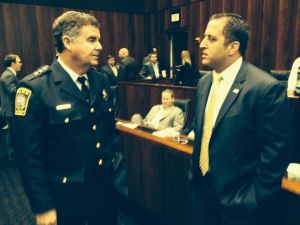- Details
- Category: Press Releases
 TINLEY PARK- As lawmakers returned to Springfield for Tuesday’s session, so did bus loads of college students. They came to the capital to discuss their concerns over the cuts to higher education that the governor has proposed. The dramatic cuts to state universities and MAP grants could cause tuition rates and class sizes to rise, as well as force colleges to cut staff and administrative positions.
TINLEY PARK- As lawmakers returned to Springfield for Tuesday’s session, so did bus loads of college students. They came to the capital to discuss their concerns over the cuts to higher education that the governor has proposed. The dramatic cuts to state universities and MAP grants could cause tuition rates and class sizes to rise, as well as force colleges to cut staff and administrative positions.
State Senator Michael Hastings (D-Tinley Park) had the opportunity to speak with students from Governor’s State University, located near the 19th district.
“Governor’s State is an incredible university that prides itself on offering affordable tuition. If these cuts are implemented that would severely limit their ability to continue offering it,” Hastings said. “Cutting funding to universities would absolutely devastate the higher education system in Illinois.”
This year, Senator Hastings and his colleagues voted multiple times to fund Illinois universities and MAP grants, but all of these measures failed to be signed into law.
Kaylee Barron, a student from Tinley Park who attends the University of Illinois Urbana-Champaign, spoke to how the budget cuts would impact her in the audio clip below.
.
- Details
- Category: Press Releases
 TINLEY PARK-As a veteran of Operation Iraqi Freedom and as a strong supporter of our current military, I am very pleased to see that the candidates for the 2016 elections are already talking about veterans’ issues.
TINLEY PARK-As a veteran of Operation Iraqi Freedom and as a strong supporter of our current military, I am very pleased to see that the candidates for the 2016 elections are already talking about veterans’ issues.
One thing that they and all our elected officials need to address is the health care situation that caused so much concern for the Veterans’ Health Administration (VHA) last year - namely, excessive caseloads and long wait times for sick veterans seeking care.
Unfortunately, those problems are still ongoing. As recently as November 2014, some 600,000 veterans were on wait lists of a month or more, and that number equates to about 10 percent of all VA patients.
Since last year, the number of veterans on wait lists has increased by more than 50 percent. Appreciate the fact that these delays aren’t just inconveniences. Health conditions can become more complicated the longer a patient is forced to wait for care. Such a widespread, systemic problem needs to be addressed at once.
The issue with VA facilities isn’t that they don’t have quality people. It’s that they aren’t able to use the talented staff they do have to their fullest potential. In particular, Advanced Practice Registered Nurses (APRNs) are not considered full practice providers under current VHA policy. This is out of step with the Department of Defense, which already utilizes APRNs to treat active-duty troops.
It certainly shouldn’t be a controversial decision, as APRNs are highly qualified to take on a bigger role in VA hospitals and clinics. Many people are surprised to learn that, in addition to a bachelor’s degree, APRNs hold graduate degrees, multiple certifications, hours of clinical experience and enroll in continuing education courses. APRNs are, without a doubt, capable of much more than they are currently allowed to do in VA facilities. Make use of their extensive education and training to allow veterans to be treated in a timely manner.
Moving forward, recognizing APRNs as full practice providers will increase overall access for all veterans. Our veterans have sacrificed plenty for us, and the least we can do for them is improve their access to quality health care.
The 2016 presidential candidates don’t need to wait to win next year to do something tangible regarding this proposal. Merely discussing it raises awareness and garners more support. But, more importantly, some candidates may even be in the position to take action in their current offices.
Our elected officials on both sides of the aisle should support this common-sense effort. Recognizing APRNs as full practice providers is a step in the right direction to serving our veterans with the expedient health care they deserve.
Do it without delay.
- Details
- Category: Press Releases
TINLEY PARK-For many college students in Illinois, the Monetary Award Program (MAP) is a valuable resource that helps them pay their way through school. The average MAP grant recipient gets about $2,700 towards their tuition, and as tuition costs at colleges and universities continue to rise, these grants have become essential to these students’ success.
State Senator Michael E. Hastings (D-Tinley Park) recently voted to invest in the MAP program for this year, which hasn’t been done due to the current budget stalemate.
“This is an investment in both our future and future of these students as well,” Hastings said. “They will go on to graduate, get jobs, and help shape the economy and landscape of our country. With these grants, they get the financial assurance they need to make this happen.”
Senate Bill 2043 will invest $374 million to the MAP grant funding. The measure passed the Senate with a 37-0-14 vote.
Senator Hastings spoke out on the floor in support of the investment, the audio is available below.
- Details
- Category: Press Releases
Dear Friends,
With the unfortunate events brought on by the deaths of Michael Brown in Ferguson, Missouri and Eric Garner in Staten Island, New York, I joined my colleagues in the Illinois House and Senate in supporting a comprehensive law enforcement reform package.
As a part of a comprehensive negotiation process, community groups, law enforcement officials, States’ Attorneys and the Attorney General’s office were all invited and participated in providing a solution.
As a result, Senate Bill 1304 passed both chambers and was signed by the governor today. The legislation provides the following:
• Allows municipalities to equip police officers to wear body cameras to record their interactions over the course of the work day
• Requires all officer involved deaths to be investigated by independent investigators to prevent any improprieties, after which the report must be made public
• Prohibits the use of chokeholds when detaining individual offenders
• Increases the training requirement for all local law enforcement officers, including additional curriculum for basic training, and requirements for continuing in-service training
• Creates a Commission to review current training and certification process for law enforcement officers,
This plan will ensure that our communities will remain safe and allow for police officers to follow safer guidelines for interacting with people. Furthermore, the plan will give the public access to more information surrounding officer-involved deaths to prevent any misinformation caused by the media.
If you have any questions regarding this, please feel free to contact my office at any time.
For Illinois,
Michael E. Hastings
Senator 19th legislative district
More Articles …
Page 74 of 89


